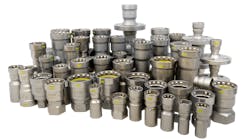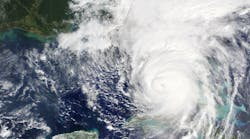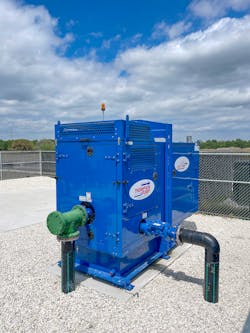By David Perry, Municipal Sales Manager, Thompson Pump and Manufacturing Company
NORTH PORT, FL — On September 10, 2017, Category 3 Hurricane Irma made landfall in southwest Florida near Marco Island, devastating the region. The outer bands of the storm delivered 100 MPH winds and heavy rainfall directly through the City of North Port, Florida.
In the aftermath of the storm, North Port’s Utilities Department experienced exponential inflow and infiltration, power outages and extensive property damage. The team immediately began the process of assessing the damage and determined there was a need for funding to allow the city to improve the lift stations in order to help with the current emergency and prepare for any future events.
Grant Proposal
The City of North Port’s grant specialists got to work and quickly submitted a proposal for a Community Development Block Grant for Disaster Recovery (CDBG-DR) and a Community Development Block Grant for Mitigation (CDBG-MIT). North Port was awarded these CDBG funds in fiscal year 2022 through the Department of Housing and Urban Development (HUD).
With the funding now available, North Port’s Utilities Department implemented a forward-thinking approach towards effective emergency preparedness and determined the most effective use of the money was to immediately implement two solutions:
1. CIPP Pipe Lining (Cured-In-Place), which is a trenchless rehabilitation method used to repair existing pipelines, on the wastewater collection system to minimize inflow and infiltration; and
2. Install stationary bypass pumps at eight wastewater lift stations throughout the city to prevent sanitary sewer overflows.
Thompson Pumps
In 2017, the City of North Port managed approximately 122 pump stations with only 14 stationary Thompson Pumps installed. At those 14 pump stations, North Port saw no sanitary sewer overflow (SSOs) over the last six hurricane seasons.
In working with the North Port Utilities, Engineering, Grants and the Procurement/Finance Departments, Thompson Pump recommended its JSC series of pumps, the industry leader for compressor-assisted sewer bypass, emergency response and high head/high-volume applications.
North Port contracted for two of the six-inch pumps (Model: 6JSCE-DJDS-45T-DC), with maximum flows of up to 2,700 gallons per minute, maximum total dynamic heads of 195 feet and three-inch solids handling; and six of the four-inch pumps (Model: 4JSCC-DIS-4LE2T-DC), designed for maximum flows of up to 1,180 gallons per minute, maximum total dynamic heads of 170 feet, three-inch solids handling, and powered by the Isuzu 4LE2T diesel engine with ample horsepower for Thompson Pump’s 10-inch self-cleaning impeller while meeting Final Tier 4 emission standards utilizing a Diesel Oxidation Catalyst (DOC).
These environmentally friendly systems of centrifugal pumps provide fully automatic priming and re-priming without blow-by, large solids handling and feature Thompson Pump’s exclusive Enviroprime System®.
The City of North Port now has approximately 35 stationary Thompson Pumps already installed at new and existing pump stations. The City of North Port’s Utilities Department and grant team have worked to prioritize emergency preparedness to protect its residents, visitors and the environment.
Accounting for Variables
Thompson Pump recommended these JSC series pumps to maximize operational efficiency and provide redundancy at each station with an emergency bypass. The standard specification developed by North Port more than six years ago allows the city to obtain the highest quality pumping system.
More importantly, these Thompson Pump models are sized to handle the peak flow rates, maximum TDH and maximum suction lift required at each station. In addition, these stationary Thompson Pumps operate intermittently which allows the pump to consume less diesel fuel during each emergency event. It was important to account for other variables, such as inflow and infiltration, where the pump has more flexibility and reduces the overall risk of an SSO during any major rain event. Overall, the functional intention of any sewer pump station is to move water to the treatment plant and diesel-driven generators don’t do that.
The eight pumps for North Port will be heading into production at Thompson Pump later this year. The team plans to have them all built, delivered and installed before the 2024 hurricane season starts on June 1, 2024.



